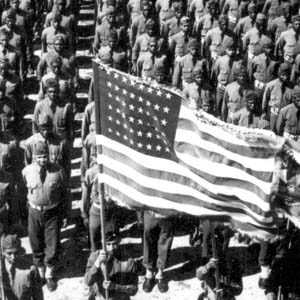Usually, I write about health care, but this Veterans Day, I’ll recall a few Army stories concerning my father, First Lieutenant Harold Graboyes. I’ll tell the stories, because he’s been gone for 20 years and can no longer share them himself.
In the peacetime draft preceding World War II, the recruiter asked him which service he would prefer. The Navy, he had heard, had better food, so he requested the Navy. Naturally, they put him in the Army and sent him to Camp Lee, Virginia, 25 miles south of Richmond.
In early December 1941, he had a weekend pass to visit my mother, Lois, in nearby Petersburg. (They married in 1944.) Before he could leave, he was told that all weekend passes were canceled. “Why?” he asked. “Because we’re expecting an attack from Japan at any moment” came the answer. The newspapers were filled with ongoing U.S.-Japan peace talks, so he asked why the camp’s brass believed war was imminent. One of the camp’s officers, it seemed, had a sister who was romantically involved with a Congressman—hence, the grapevine. As Pearl Harbor was under attack, Dad said, “I was marching with a rifle, guarding a water tower in southeastern Virginia from the Japanese fleet.” Not prone to conspiracy theories, he always cast a skeptical eye toward claims that Pearl Harbor was entirely unexpected.
He was a loyal soldier, eternally grateful that the service helped lift him from the poverty that befell his family in the lead-up to the Great Depression. He said his one brush with military authorities came when he was reported for openly criticizing the internment of Japanese-Americans. He had a close friend in that community and thought internment violated basic American principles. Higher-ups told him to keep his thoughts to himself.
At some point, an officer informed Dad that he would soon deploy to Europe as a foreign language interpreter for U.S. intelligence services. That would be a problem, he replied, given that he knew no foreign languages, other than a few Latin words and bits of high school French. The officer, apparently incensed, accused him of trying to avoid deployment to a war zone. The misunderstanding arose from Dad’s habit of entertaining friends by pretending to speak a variety of languages—as comedian Sid Caesar did in his routines. Some credulous passerby apparently overhead Dad’s fake foreign language discourses and sent his name up the chain of command as a linguist. For the angry officer, Dad had the difficult task of proving a negative—that he spoke no foreign languages. Apparently, he performed his comedy routine and made his point adequately.
Dad was brilliant, with a deep love of history, physics, and other fields. Poverty and war, though, limited him to a single semester of night classes at the University of Pennsylvania. Fortunately, the Army recognized his brains and made him a highly respected instructor of logistics and military law. His students, he noted proudly, included generals. But he took particular pride in the rapport he enjoyed with classes of African-American troops—in a segregated army in a segregated town.
His pedagogical talents led the base commandant to keep him stateside for the duration of the war. In his final year of active service, remaining at Camp Lee depended on his becoming an officer. And so he did—the top graduate and regimental commander of his class. (Our home movies show him as an imposing figure, leading the parade at graduation.) After he died, my mother mentioned that he really hadn’t wanted to become an officer. He loved the life of a master sergeant—the big man on base—whereas second lieutenants were perceived as being a dime a dozen.
Ultimately, he rose to first lieutenant and was offered a promotion to captain in the reserves after the war. By then, he was married, running a hectic business, and raising an infant son (my brother). A promotion, he thought, would be nice. But a clerk handed him a phone-book-sized stack of forms to fill in for his promotion. He said he didn’t have time for the paperwork and took his honorable discharge—always grateful for what the service had given him.
Rest in peace, Lieutenant.

